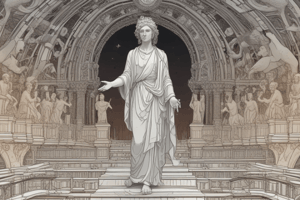Podcast
Questions and Answers
According to Rawls's theory, what is the primary source of legitimacy for a just society's fundamental laws?
According to Rawls's theory, what is the primary source of legitimacy for a just society's fundamental laws?
- The historical continuity of the legal tradition.
- The explicit consent of a pre-established legal authority.
- Compliance with pre-existing legal norms.
- Adherence to the principles of justice as fairness generated through a fair process. (correct)
Which aspect of the constituent power does Rawls's work primarily focus on?
Which aspect of the constituent power does Rawls's work primarily focus on?
- The specific legal procedures for exercising it.
- The existing legal frameworks that regulate it.
- The historical evolution of its application.
- The principles of justice that should guide its exercise. (correct)
In Rawls's view, how is the establishment of fundamental laws best understood?
In Rawls's view, how is the establishment of fundamental laws best understood?
- As a derivative of existing constitutional structures.
- As an imposition of an elite group's values on all citizens.
- As a function performed exclusively by legal experts.
- As rooted in the collective decision-making of the people via social contract tradition. (correct)
What is the main implication of Rawls's ideas for any framework governing the constituent power?
What is the main implication of Rawls's ideas for any framework governing the constituent power?
Which of the following best characterizes Rawls's approach to the legal framework of the constituent power?
Which of the following best characterizes Rawls's approach to the legal framework of the constituent power?
Flashcards
Constituent Power
Constituent Power
The authority to establish the fundamental laws of a society. It's the power to create the very foundation of a political system.
Rawls & Constituent Power
Rawls & Constituent Power
Rawls's theory emphasizes fairness and equality in creating just institutions. He focuses on the principles of justice that should guide the creation of a just society, rather than the legal mechanisms of that creation.
Legitimacy in Rawls's Theory
Legitimacy in Rawls's Theory
The idea that a just society is formed when its principles are chosen through fair procedures and reflect widely shared values. This legitimacy comes from the process, not pre-existing laws.
Social Contract and Constituent Power
Social Contract and Constituent Power
Signup and view all the flashcards
Justice as Fairness and the Constituent Power
Justice as Fairness and the Constituent Power
Signup and view all the flashcards
Study Notes
Rawls and the Constituent Power
- Rawls does not explicitly detail a specific legal framework for the constituent power. His focus is on the justice principles forming a just society, not the legal mechanisms of establishing it.
- Rawls's A Theory of Justice emphasizes fairness and equality in institutional design. The constituent power—the authority to establish fundamental laws—is not directly addressed in legal terms.
- Legitimacy is crucial in Rawls's theory. A just society arises from fair procedures and shared values, not pre-existing laws. Legitimacy stems from the process.
- Rawls connects decisions on fundamental law to the social contract tradition. The people, collectively, decide on a state structure reflecting considered judgments. This doesn't rely on existing law; it's based on principles from a fair, reflective process.
- Rawls does not offer a specific legal framework, yet implicitly suggests any initial legal framework must align with principles of justice as fairness.
Studying That Suits You
Use AI to generate personalized quizzes and flashcards to suit your learning preferences.





